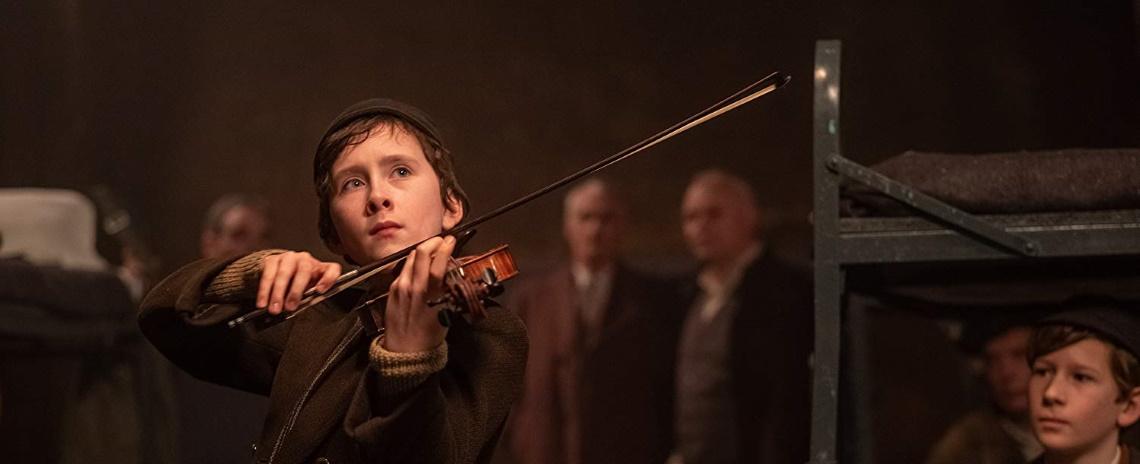François Girard is not a lyrical filmmaker. That’s because his movies deal almost exclusively with instrumental music. His breakout film, Thirty Two Short Films About Glenn Gould (1993), showcased the various facets of the titular renowned pianist’s daily life. Girard’s follow-up, The Red Violin (1998), tracks one infamous instrument throughout three centuries of ownership. The director’s most recent feature, an adaptation of classical-music commentator Norman Lebrecht’s novel The Song of Names, perpetuates the director’s tendency to honor the art of the symphony through the medium of film. As a harmonious two-pronged story about how daily life changes over time, it can be considered a summation of the themes that Girard often revisits.
The film begins in 1951 — London’s elite have gathered to see violin virtuoso Dovidl Rapaport (Jonah Hauer-King), a 21-year-old prodigy from Poland, deliver what is sure to be a once-in-a-lifetime performance. There’s a problem, though: Dovidl is nowhere to be found. His adoptive family tries to remain calm as the massive crowd of wealthy patrons grows increasingly impatient. The posted showtime comes and goes, but Dovidl (sometimes referred to as David Eli) still hasn’t appeared. The promoters have no choice but to call it off and send everyone home. Dovidl’s friend Martin (Gerran Howell) offers to look for him, but his father fears the worst.
Flash-forward three decades to the mid-1980s: Martin (Tim Roth) is still heavily immersed in the world of classical music, even though Dovidl hasn’t been seen since that disastrous no-show evening. By day, Martin officiates solo competitions and meets with prospective students. His nights and weekends are spent hunting down clues that might provide some answers to the questions that have eaten away at him for years: What happened to Dovidl? Why didn’t he show up? Is he still out there somewhere? When a young musician exhibits an unmistakable tic — the same good-luck ritual that Dovidl once performed before playing — it proves to be exactly the sort of clue that Martin has been searching for.
Martin’s chance encounter with this burgeoning cellist sends the narrative seesawing back and forth between his search for Dovidl in the 1980s and the pair’s childhood friendship during World War II. As Martin gets closer to locating the missing musician, the viewer gets closer to understanding why the search is so important to Martin in the first place. Flashbacks reveal that, as Hitler’s German forces inched closer to Poland, Dovidl’s father sent him to stay with Martin’s family. Jumps to the ’80s reveal that Dovidl returned to Poland after pulling his disappearing act at the concert. The film continues this back-and-forth for its duration, to diminishing degrees of effectiveness. Imagine switching the channel from a Holocaust drama to a low-rent prestige-television procedural every 10 minutes or so — this is the sensation one gets when watching The Song of Names.
The scenes that take place in the 1950s attempt to contextualize Martin’s investigation 35 years later. As a matched pair, these two timelines work well enough together, but taken individually, they each have their problems. In the mid-20th-century scenes of young Martin and Dovidl growing up in wartime London, the film strives to examine religion, nationalism, trauma, family, music, and prejudice through the eyes of adolescents. That’s an ambitious slate of themes, and there’s far too much being crammed into these relatively brief midcentury segments for it to cohere in the way that Girard likely hoped. It may be that in Lebrecht’s novel the story has the time and space to flesh these themes out fully, but less than half of a 113-minute film just isn’t sufficient breathing room for this sort of multidimensional drama.
Martin’s search for Dovidl in the mid-’80s works a bit better as a gripping narrative, but it receives even less screen time than the post-World War II passages. Tim Roth is one of the most underrated talents working today, with his performances in recent works like The Hateful Eight (2015), Twin Peaks: The Return (2017), and Luce (2019) serving as reminders of his talent. His presence is always welcome whenever he’s on screen here, but every time Martin actually seems to make some investigative progress, the film cuts back to his childhood. It begins to feel disappointing when the action flashes back to the midcentury plot. Girard and screenwriter Jeffrey Caine could have reworked these flashbacks to keep them from hindering the (arguably) more interesting story unfolding in present day. As it stands, neither of the film’s undernourished storyline really gets the time or the space to be impactful.
By the time the meaning behind The Song of Names’ title is revealed, it’s clear just how strange Girard’s latest is. In a film that’s an overly serious affair from the start, Girard and Caine double down on the solemn tone in the final act. The film’s melodies — themes of faith in trying times, dedication to a craft that can never truly be mastered, and finding family where you are — all enjoy one last refrain in the final stretch, to underwhelming effect. What begins as a love letter to a violinist’s craft ends up transforming into a statement about faith’s capacity to shed the individual in favor of the whole. As with the film’s contrasting plotlines, there’s nothing inherently flawed with either these theses. However, the film positions them at odds with one another, so that The Song of Names feels like listening to a violin concerto in one ear and a fiddle tune in the other.
Rating: C


